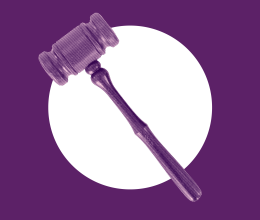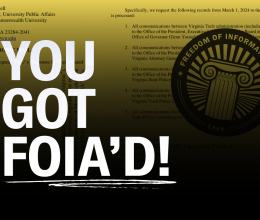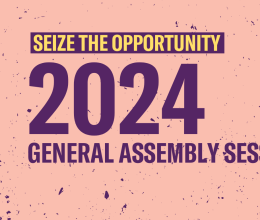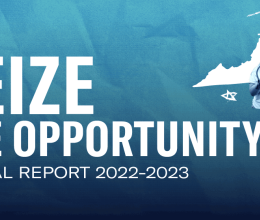
By Kent Willis, Executive Director, ACLU of Virginia
What could possibly be wrong with a minute of silence to begin each day in Virginia's schools? It seems so innocent, perhaps even salubrious, against the turmoil of student life so long on frenzy and short on reflection. But Virginia's legislators, who are trying to make this minute mandatory in every school, have something far more insidious in mind than a brief period to gather one's thoughts before beginning another hectic day of reading, writing and arithmetic.
Traditionally, minute of silence laws have been used to promote religion in public schools. Twenty years ago, Alabama's lawmakers went looking for a way to circumvent the U.S. Supreme Court's ban on organized prayer in schools. They came up with the idea of a minute of silence, fully expecting every school in Alabama to use it for prayer.
With an innocent-looking law and a wink at the teachers responsible for implementing it, they had figured out how to get organized religion back in the schools. They said this during the legislative deliberations. And when parents of students filed a lawsuit claiming the law violated the principle of separation of church and state, they said it again--defiantly--in the courtroom. The U.S. Supreme Court easily saw the wolf under this sheep's clothing and ruled that the Alabama law was unconstitutional, not just because of what it said, but also because of the intentions of the lawmakers who created it.
Judging from the deliberations in the Virginia Senate earlier this month, the only progress that has been made since the Alabama case is that legislators have gotten more devious. Figuring that the main reason the Alabama law fell prey to the Supreme Court was that legislators let it be known what they were thinking, Virginia's lawmakers have decided on a new tactic. The wink is still there, as is the innocent looking language, but now lawmakers are falling all over themselves to claim--very loudly--that the minute of silence has nothing to do with religion.
But a close look at the bill itself and its history thus far in the General Assembly reveals something quite different. The proposed mandatory minute of silence bill is actually an amendment to an existing minute of silence law that allows school districts to decide on their own if they wish to adopt such a policy. In altering the language of the existing law from optional to mandatory, legislators made two additional changes that seem to reveal their true intentions.
They first removed language from the current law proclaiming the state's neutrality toward religion in public schools. The deleted language guaranteed that students would "be subject to the least possible pressure from the Commonwealth either to engage in or to refrain from religious observation" during the minute of silence.
The concept of government neutrality on religion is the cornerstone of religious freedom. It keeps government away from religion so that the power of the state cannot be used to suppress religion or promote one religion over another. The result is that people in this country are freer to practice the religion of their choice than in any place in the world at any time in history.
Presumably concerned that a reasonable person -- or a court -- might think that removing the language about neutrality on religion was a way of saying the state should not be neutral on religion, some legislators tried to restore it. No way, said the minute of silence supporters.
The other change to the existing law requires teachers to announce aloud to students at the beginning of each school day that it is time to "meditate, pray or reflect." Some lawmakers tried to remove the obvious religious directive contained in this language by turning the law into a pure minute of silence bill, with no references to prayer -- which, ironically, is exactly what the bill purports to be. That measure was also defeated.
When supporters of this bill blocked every attempt to render the state neutral on religion, there is only one conclusion to draw--they did not want the state to be neutral on religion. And that makes it unconstitutional, according to good sense and the U.S. Supreme Court.
The ruse of Alabama legislators did not work. Now, hopefully, the ruse of Virginia legislators has been exposed, and they will stop this charade before it goes too far.
There may be a way to make a minute of silence law that works, one that will allow students a short period at the beginning of each day to collect their thoughts, including praying quietly to themselves if they so choose. But it will require insight, respect for the constitutional right of religious freedom, and some research -- a rare combination for Virginia lawmakers.
First, as with any proposed law, legislators ought to determine if a minute of silence is likely to do any good. This may come as a shock to many, but this potentially burdensome law was apparently introduced without surveying school personnel in Virginia, interviewing education experts, or performing any other kind of systematic research to determine its efficacy. Lawmaking needs to be more responsible than that.
Second, the law must state that its purpose is neither to encourage nor discourage prayer in school. In this regard, the General Assembly ought to direct the State Board of Education to issue instructions to teachers on how to implement this law consistent with the Constitution. Indeed, to make certain the time period is not improperly used, the law ought to include punishment for teachers who use it for the wrong purposes.
Third, the bill should be for a minute of silence for serious thought, not for "meditation, prayer or reflection." Serious thought encompasses meditation, prayer and reflection without asking teachers to suggest, even partially, that students should be praying.
Is it worth all that? A serious legislator who is not surreptitiously trying to slip official prayer back in school would take these precautions. The Senate let this bill glide through early in the General Assembly session, without paying close attention to its purpose. Members of the House of Delegates, having seen the history of this bill in the Senate, now have the rare advantage of a kind of virtual hindsight. For the sake of religious freedom in Virginia, let us all hope they use it.




